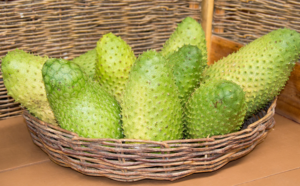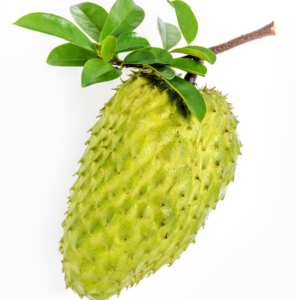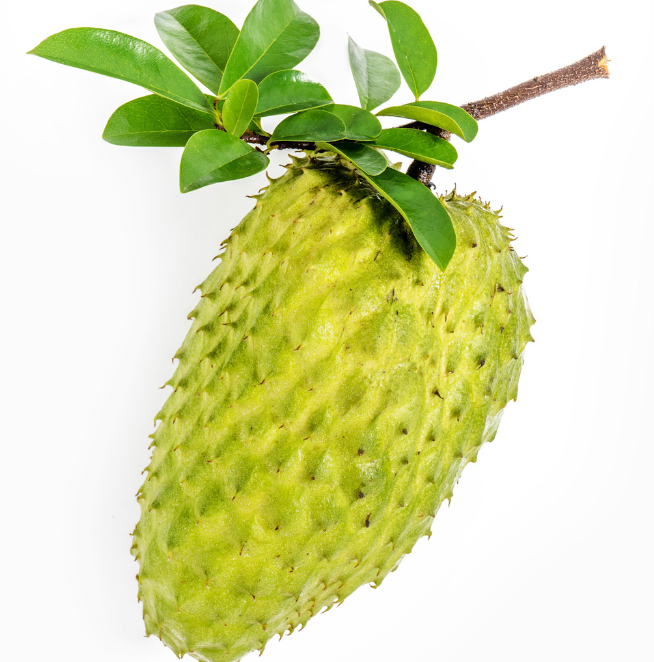Graviola is not only a food but a popular medicinal plant used in some areas of the world such as the Amazon rainforest to assist with healing from many ailments. But is Graviola safe? One red flag you may have heard about is whether Graviola causes Parkinsons' disease? If that's you, let's look at the evidence linking this fruit to Parkinson's and make sense of it. By knowing the proof you can best figure out of Graviola supplements are the right option for you.
What Is Graviola?
Graviola (Annona muricata) is a tropical evergreen tree belonging to the Annonaceae family (custard apple) of plants. It's a subdivision of the Magnolia order. Over 2000 species of these plants have been identified and include:
- Aligator apple (Annona glabra)
- Custard apple (Annona reticulata)
- Sweetsop (Annona squamosa)
- American paw paw (Asimina triloba)

Another member of this family is Acai berry (Euterpe oleracea). While traditionally eaten as food, for centuries, the seeds, roots, bark, and leaves of Graviola have also been used as a medicinal plant to aid in managing a wide range of health problems such as high fever and malaria to heart and liver problems. Some may also consume the fruit as a natural sleep aid.
Depending on the ailment, Graviola may be taken internally or applied topically to the skin. In some parts of the world, the plant has even been used as a natural insecticide too. While the tree contains thousands of bioactive substances, one group of compounds that are thought to be key active ingredients are called acetogenins.
How Is Graviola Identified In Dietary Supplements?
The fruit may be called by several names so if you want to know if your supplements contain Graviola, these names may be a tip-off.
- Annona muricata
- Annona macrocarpa
- Paw-Paw fruit
- Custard apple
- Soursop (and Sour sop)
- Annonaceae fruit
- Prickly custard
- Brazilian Cherimoya
What Do People Take Graviola Supplements For?
Graviola may be an ingredient in dietary supplements. It can also be purchased by itself in capsule, liquid, tincture, and powder form. People may choose to take supplements containing this plant because they've heard it has many health benefits such as curing cancer, shrinking fibroid tumors, helping diabetes, lowering blood pressure, reversing hair loss, boosting weight loss, and burning belly fat.
Proposed Benefits of Graviola
| Antiinflammatory | Hair loss |
| Fibroid tumors | blood sugar levels |
| Pancreatic cancer | Weight loss |
| Hypertension | Colon cancer |
| Breast cancer | Herpes |
| Lung cancer | Cancer in dogs |
| Kidney stones |
While Graviola has been investigated for many reasons, in several studies it is combined with other ingredients. This makes it difficult to figure out how effective the fruit is by itself. Also, many investigations involve animals. Animal research may not produce the same results as giving it to people and seeing what happens.
What Is Parkinson's Disease?
Parkinson's disease (PD) is a movement and gait disorder where people experience tremors and vision problems and may not walk well, resulting in clumsiness and other problems. It's caused by the breakdown of dopamine-producing brain cells. This lowers the amount of dopamine in the body. Dopamine, a hormone/neurotransmitter is involved in controlling movement. So, when the body can't make enough dopamine, movements, and walking become difficult.

People with PD often report slowing down (bradykinesia) and feeling stiff. According to the Parkinsons' foundation (Parkinson.org) over 10, million people worldwide have Parkinson's disease (PD). This includes over 1 million Americans. This number is expected to increase to over 1.2 million by the year 2030.
Each year 60,000 people are diagnosed with PD. The risk of Parkinson's increases as we get older and strangely, men appear to be 1.5 times more likely to be afflicted with PD than women. According to the Center for Disease Control and Prevention, PD is the 14 leading cause of death in America.
Types of Parkinson's Disease
While Parkinson's disease may be considered a single disorder, it's actually a family of syndromes. According to the Michael J Fox Foundation (michaeljfox.org), the most common form of PD is idiopathic and occurs for unknown reasons. Some forms of the disorder don't exactly match the classic disorder and are called “atypical.” Atypical Parkinson's disease includes:
- Progressive Supranuclear Palsy (PSP)
- Corticobasal Syndrome (CBS)
- Multiple System Atrophy (MSA)
- Dementia with Lewy bodies (DLB)
- Vascular Parkinsonism (VP)
Here's a video from the Michael J. Fox Foundation:
There is also Drug-induced Parkinsonism, in which the disease is triggered by medications. Drug-induced PD is sometimes called secondary Parkinsons' disease because it occurs secondarily as a result of a toxic reaction. This can happen after repeated exposure to herbicides or pesticides or when medications, such as some anti-depressants calcium channel blockers, and anti-psychotics that lower dopamine levels in the brain.
Famous People Who Have and Had Parkinson's Disease
- Michael J Fox (he has a foundation for it too)
- Robin Williams
- Billy Graham
- Pope John Paul II
- George HW Bush
- Jessy Jackson
- Bob Hoskins
- Ozzy Ozborne
- Janet Reno
- Linda Ronstadt
Proof For Graviola Causing Parkinson's Disease
The theory that Graviola might trigger Parkinson's disease first was reported in 1999 in a study was published in the prestigious journal, Lancet. There it was reported in one year, 87 people with PD syndrome were seen at a hospital in Guadeloupe, West Indies. Some of the people did not respond to levodopa, the usual treatment for PD. A breakdown of the cases revealed that:
- 22 had Parkinsons' disease
- 31 had progressive supranuclear palsy (PSP)
- 30 had atypical parkinsonism
- 4 had atypical PD associated with motor neuron disease
- Almost half of the people (44 individuals) were men
After analyzing the habits of these people, it was discovered that 85 of the people with PSP (98%) had regularly consumed Graviola fruit and/or drank Graviola tea and that the amount of fruit and tea they ingested was significantly greater than those who had Parkinson's disease and those who did not consume Graviola. This links the fruit to atypical progressive supranuclear palsy (PSP).
While this study reports on an observation – which may not directly prove Graviola is connected to Parkinsonism – it's pretty interesting that 98% of those with PSP Parkinsons' were eating a lot of this fruit or drinking tea containing it.
Interestingly, it's been speculated that what was seen in Guadeloupe might be similar to parkinsonism dementia cases seen in Guam and Rota in the late 1980s.
What Are The Toxins in Graviola That Might Cause PSP Parkinsons?
There are over 200 classes of compounds that have been identified in the Graviola tree. One class of bioactive compounds is called acetogenins which are found in the leaves stems, bark, and seeds of the plant. Over 120 different acetogenins are known to exist. Different acetogenins appear to have different effects on the body.

Preliminary research suggests some acetogenins may have anti-cancer effects, perhaps by disrupting mitochondria functioning. Other acetogenins can act as natural insecticides against a wide array of parasites. Interestingly when acetogenins-based insecticides were tested in plants, they failed due to being too toxic to other organisms.
The most abundant acetogenin in graviola is called annonacin. Animal research reveals that annonacin is toxic to brain cells. It is believed that annonacin kills brain cells by interfering with the mitochondria, preventing them from making ATP energy. Without energy, brain cells die. Annonacin appears to be toxic to dopamine–producing brain cells as well as other neurons as well.
Another acetogenin, called reticuline, is also considered a neurotoxin although it is thought to be about 1000 x weaker than annonacin. While acetogenins are regarded as a compound of interest, the cause of atypical PSP parkinsonism remains a mystery.
Compounds in Graviola Thought To Be Toxic To Brain Cells
Below are some of the acetogenins and alkaloids considered toxic to dopamine-producing brain cells:
- annonacin
- annonacinone
- isoannonacinone
- solamin
- squamocin
- reticuline (alkaloid)
- coreximine (alkaloid)
How Much Graviola Is Toxic To Brain Cells and Might Trigger Parkinson's?
According to one assay, a piece of Graviola fruit contains 15 mg of annonacin and a can of commercially available Graviola nectar contains 36 mg. These researchers went on to state that an adult person who consumes 1 piece of Graviola fruit or 1 can of nectar each day for a year, would receive the same dosage of annonacin found to be neurotoxic to animals when it was injected. From this one might assume that it would take a long-term exposure to acetogenins to cause a harmful reaction.
Does this mean if you've been regularly eating about this amount of Graviola or drank it as a tea or nectar you will get atypical PSP parkinsonism after a year's time? This is not known. For example, is it possible the dosage might be more or less than this depending on your body weight? Also, are women at lower risk than men?
To make this matter more complicated, in 2010, AVIS, the French Food Safety Agency, stated that there was not enough proof yet and it was not possible to conclude that the cases of Parkinson's disease observed in Guadeloupe are connected to Graviola consumption.
Do Gravolia Supplements Cause Parkinsons Disease
Graviola fruit or extract and other members of the Annonaceae family of plants may be found in a variety of dietary supplements. So how do you know if its there? The only way to know is to look at the Supplement Facts label. Look for the names listed above. Also, consider calling the company that makes the supplement if you are not sure.
So far, there is no direct proof that supplements containing Graviola (Annona muricata) are brain toxic or cause Parkinsons' disease. In the report above people were eating it as a food rather than taking dietary supplements. Reports of individuals developing movement disorders like PD from supplements could not be located. There may be several reasons for this such as:
- Companies may screen out acetogenins during processing
- People may not take supplements long enough to experience harmful changes
- Parts of the plant used may not contain harmful ingredients
- Supplements may not contain enough of the suspected ingredients to produce negative effects
One of the most popular plant members of the Annonaceae family is acai berries. Acai berries are found in numerous dietary supplements including is MonaVie. The MonaVie supplement has been the subject of several safety tests that revealed no problems. If you take Annona muricata supplements and are concerned about acetogenins, consider calling the manufacturing company and asking if they test for acetogenin levels.
Who Should Avoid Graviola Supplements, Side Effects, And Contraindications
Speak with your pharmacist and doctor if you are concerned about this. In particular, people who have Parkinson's disease may want to avoid Graviola and supplements containing it until more is known. Other tips include:
- Stop using at least two weeks before surgery
- Avoid if pregnant or breastfeeding
- Medicine interactions with Graviola need more research
- It's not known if the fruit interacts with other movement disorders like multiple sclerosis or amyotrophic lateral sclerosis (ALS)
What's The Verdict?
The link between the fruit of the Graviola tree and parkinsonism is intriguing and while most of the evidence stems from observational studies, it's interesting some of the substances found in the fruit appear to be neurotoxic. At the least, its probably worth avoiding this fruit and teas made from the tree if you have Parkinsonism.

Leave a Reply